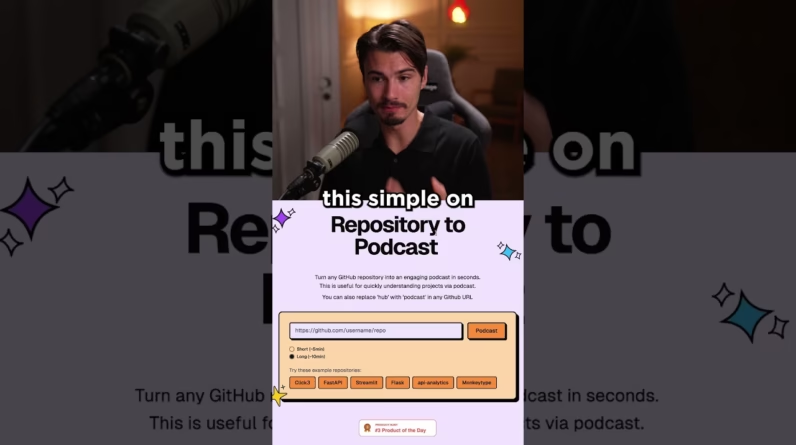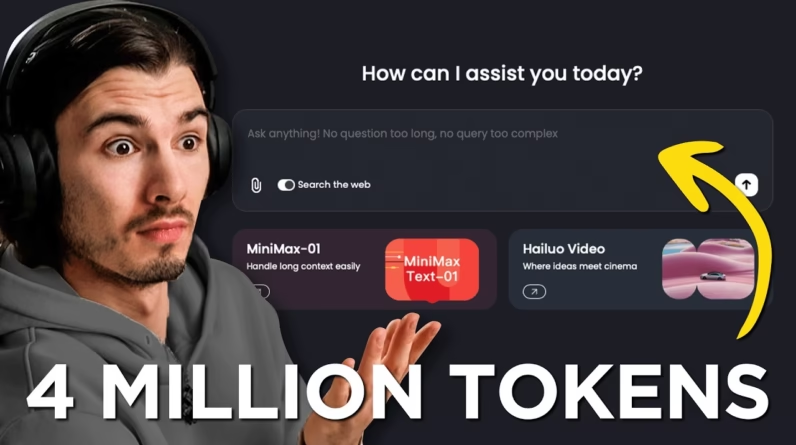
Transforming a GitHub repository into a podcast has just become a breeze with a handy new tool. This web app allows you to input any GitHub repo URL and generates a concise 5-10 minute podcast that explains everything in an easy-to-understand way. No prior tech knowledge is necessary, making complex information accessible and enjoyable.
In this article, you’ll discover how this free tool can simplify your experience with GitHub’s vast resources. By breaking down technical details into digestible audio content, you can stay informed while multitasking, whether you’re commuting or relaxing at home. Get ready to enhance your understanding of tech without getting lost in jargon!
Table of Contents
Turning GitHub Repositories into Podcasts: A Friendly Guide

Overview of GitHub and its Importance
What is GitHub?
GitHub is a cloud-based platform that provides version control for software projects, allowing you to store your code in repositories. Think of it as a digital filing cabinet where you can keep everything organized and accessible. Whether you’re collaborating with others or working solo, GitHub helps you manage your code effectively. It’s indispensable for developers and teams alike because it fosters collaboration and encourages open-source development, which means anyone can contribute code and ideas.
Role of GitHub in Software Development
In the world of software development, GitHub plays a pivotal role. It not only allows you to save and track changes in your code but also acts as a social network for developers. You can fork (copy) others’ projects, suggest changes, and communicate with other developers through issues and discussions. This collaboration results in quicker development cycles and rapid innovation, all while keeping the code base secure and organized.
Common Uses of GitHub Repositories
GitHub repositories are commonly used for a variety of purposes. You might find them hosting open-source software, serving as portfolios for developers showcasing their work, or maintaining documentation for products and services. People also use GitHub to contribute to community projects, develop and share libraries of code, and even teach programming through interactive examples.
Introduction to Podcasting
What is a Podcast?
A podcast is essentially a series of spoken-word content delivered in episodes. It can cover any topic ranging from technology, news, and entertainment, to education. You can listen to podcasts on-demand, anytime and anywhere, making them a versatile medium for knowledge sharing. The rise of mobile devices has made podcasts more accessible than ever, allowing you to learn while multitasking.
The Growth of Podcasting in Recent Years
In recent years, podcasting has exploded in popularity. As more people seek convenient and engaging ways to consume content, the podcasting medium has evolved to cater to these preferences. Statistically, millions of Americans listen to podcasts—many on a regular basis. This growth can be attributed to the ease of access on various platforms, the diverse selection of topics, and the engaging nature of audio content.
Benefits of Using Podcasts for Knowledge Sharing
Podcasts offer numerous benefits for knowledge sharing. They allow complex topics to be broken down into digestible information, which is great for learning. Additionally, you can listen to podcasts while on the go, meaning you can educate yourself without needing to commit time solely to reading or studying. Another advantage is that podcasts can reach a broader audience, including those who may not have a technical background, thus democratizing information.
Tools for Transforming GitHub Repos into Podcasts
Overview of the Simple Tool
Imagine a tool that can turn the intricate details of a GitHub repository into an easily digestible podcast episode—sounds great, right? This simple, free tool does exactly that! All you need to do is input the URL of the GitHub repository, and within minutes, you’ll have a podcast episode summarizing its content.
How the Tool Works
Once you enter the GitHub repository’s URL into the tool, it analyzes the content, parsing through the README files, code comments, and other documentation. The tool then generates a narrative that can explain the functionalities of the code in a way that’s approachable and understandable. It wraps everything up in a neat audio package, creating an engaging listening experience.
Technical Requirements for Using the Tool
Using this tool is fairly straightforward, and you don’t need extensive technical knowledge. All you’ll need is a reliable internet connection and a browser to access the tool. No additional software or accounts are necessary, making it user-friendly for both beginners and experienced developers. It’s designed for anyone eager to understand GitHub repositories without getting lost in the technical jargon.
Step-by-Step Guide to Creating a Podcast from a GitHub Repo
Accessing the Tool
To get started, simply navigate to the web application that hosts this podcast tool. You’ll find a clean, intuitive interface that will guide you through the process. Don’t worry—there’s no complicated setup, just click a few buttons and you’re ready to go.
Entering the GitHub Repository URL
Next, you’ll need to find the URL of the GitHub repository you want to convert into a podcast. This could be a repository you’ve created or one that you found interesting. Copy and paste the URL into the designated input field in the tool. Once you do, the tool will begin processing the information almost instantly.
Generating and Customizing Your Podcast
After entering the URL, hit the “Generate” button. The tool will quickly analyze the repository and create a podcast episode that typically lasts between 5 to 10 minutes. You can also customize certain aspects, like the tone and style, to better suit your audience. Once it’s generated, you can listen to it and decide if you’d like to make any adjustments.
Understanding the Output of the Tool
Podcast Length and Structure
Typically, the output podcast will run between 5 to 10 minutes. This length is ideal, as it keeps the content concise and engaging without overwhelming listeners. The structure usually consists of an introduction, a detailed explanation of the GitHub repository, and a conclusion summarizing its significance.
Content Breakdown of the Podcast
The content of the podcast will often break down the key components of the GitHub repository. This could include explanations about its features, functionalities, and practical applications. The goal is to present the information in a way that non-technical listeners can still grasp.
Assessing the Clarity of the Explanation
One of the standout features of this tool is its emphasis on clarity. You should expect explanations that are straightforward and free from unnecessary jargon. The tool aims to make technical content accessible to a general audience, which is especially useful for those who might feel intimidated by complex coding languages or technical documentation.
Benefits of Turning GitHub Repos into Podcasts
Enhancing Accessibility of Technical Content
By converting GitHub repositories into podcasts, you’re making technical content much more accessible. People who may struggle with reading through code documentation can learn through audio explanations, which can foster a better understanding of the material and enhance knowledge retention.
Engaging Non-Technical Audiences
This tool opens doors for people without a technical background to engage with complex subjects. Whether you’re a business professional wanting to understand a tech tool or a student exploring various fields, podcasts provide an inviting entry point into technical topics that might otherwise seem daunting.
Facilitating Lazy Learning through Audio
Listen, we all have busy lives. Podcasts allow you to learn while doing other things—whether you’re commuting, exercising, or doing chores. It’s a form of “lazy learning” that doesn’t require diving deep into books or lengthy articles. You can absorb information effortlessly through audio.
Use Cases for Educational Institutions and Organizations
Integrating Podcasts into Curriculum
Educational institutions can immensely benefit from incorporating podcasts into their curriculum. They can use this tool to create engaging episodes that summarize complex subjects, making it easier for students to grasp challenging concepts. This method of teaching encourages student engagement and promotes a love for continuous learning.
Utilizing Podcasts for Training and Development
Organizations can leverage podcasts for training and professional development. By turning GitHub repositories that contain company projects into podcasts, employees can better understand the tools and technologies they’ll need to use daily. This method can streamline training processes and improve employee performance.
Promoting Knowledge Sharing within Teams
Creating podcasts from GitHub repositories encourages knowledge sharing within teams. Instead of relying solely on documentation, team members can listen to specific podcasts about various projects. This not only helps in keeping everyone on the same page but also enhances collaborative efforts.
Best Practices for Podcast Creation
Tips for Script Clarity and Engagement
When creating your podcast, clarity is key. Use simple language and clear explanations to ensure that your audience understands the content. Engaging storytelling can also help retain listener attention, so consider using real-world examples or anecdotes related to the repository.
Choosing Appropriate Tone and Pace
Choosing the right tone and pace is crucial. A friendly, conversational tone can make your podcast feel more inviting. Additionally, maintain a steady pace—neither too fast nor too slow—to ensure that listeners can follow along without losing interest.
Editing and Refining the Podcast Output
After generating your podcast, listen to it! This step is essential for refinement. Check for clarity, engagement, and correct pronunciation of technical terms. Don’t hesitate to edit out any sections that may not flow well or sound engaging. Quality matters, and ensuring that your final output is polished will enhance listeners’ experiences.
Potential Limitations and Challenges
Understanding Complex Technical Concepts
While podcasts can simplify complex topics, some subjects may still prove challenging. If the repository involves highly intricate technology or specialized coding languages, simplifying these concepts for a general audience can be a daunting task for the tool.
Limitation of Audio Format for Certain Content
The audio format might not suit every topic. Some technical content is best explained visually through diagrams or detailed written instructions. Therefore, while podcasts provide valuable insights, they shouldn’t completely replace traditional documentation mediums.
Dependence on the Tool’s Algorithm
The effectiveness of the tool relies on its algorithm. It may not perfectly interpret every repository, leading to oversimplification or omission of crucial elements in your podcast. It’s essential to review the generated content to ensure it accurately conveys the main points.
Conclusion
Recap of Key Points
In summary, utilizing tools to convert GitHub repositories into podcasts is an innovative way to bridge the knowledge gap. GitHub plays a vital role in software development, while podcasts emerge as a powerful medium for knowledge sharing. Together, they can make complex technical content accessible and engaging.
Final Thoughts on the Tool’s Impact
This tool can transform how you interact with technical content. By turning intricate GitHub repositories into digestible audio formats, learning becomes a more enjoyable endeavor, enabling you to understand and engage with technology more effectively.
Encouragement to Start Exploring GitHub Repos Through Podcasts
So, why not give it a shot? Dive into the world of GitHub repositories and start creating podcasts today! Whether for personal growth or professional development, turning technical content into engaging audio will expand your horizons and deepen your understanding of technology. Happy podcasting!







